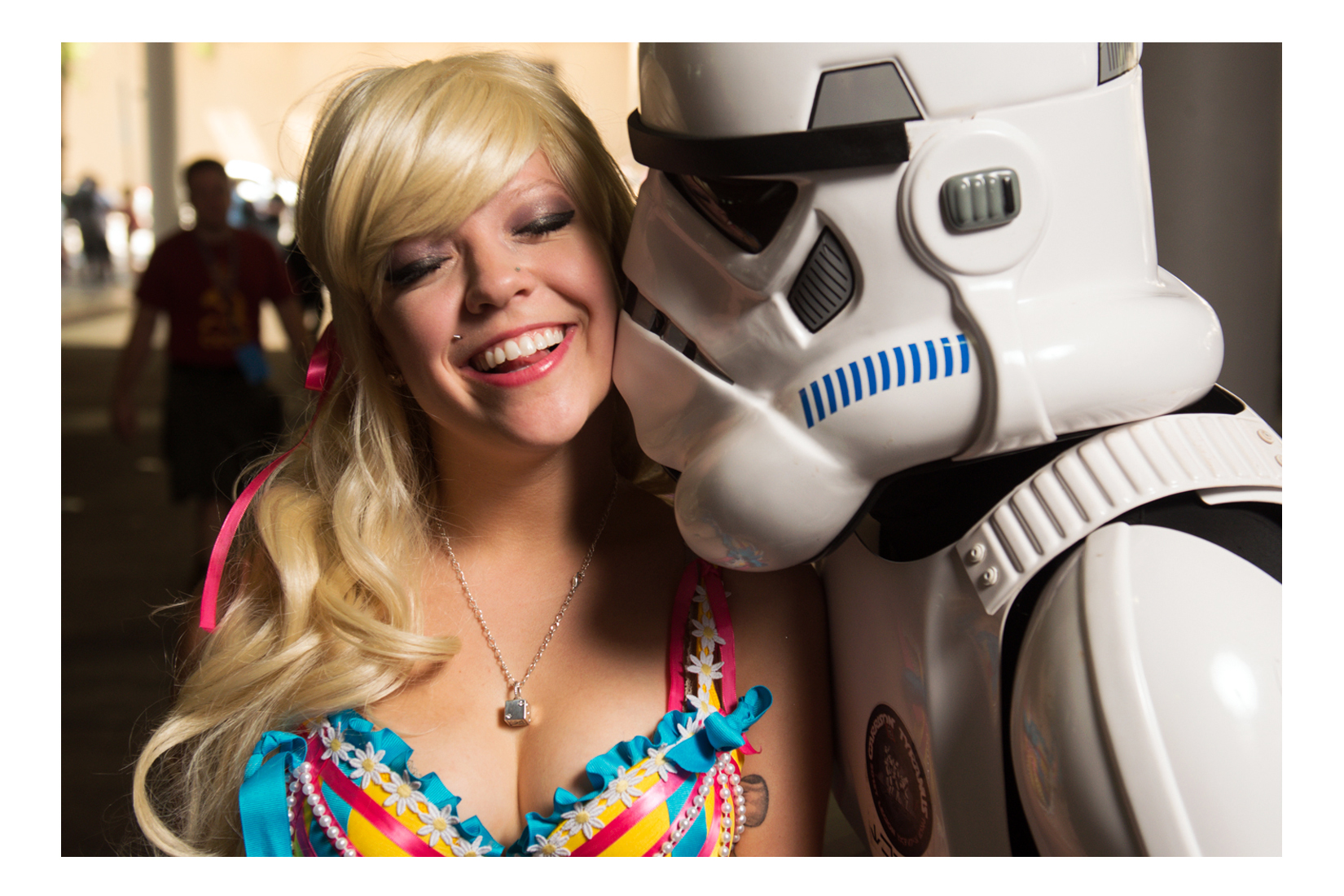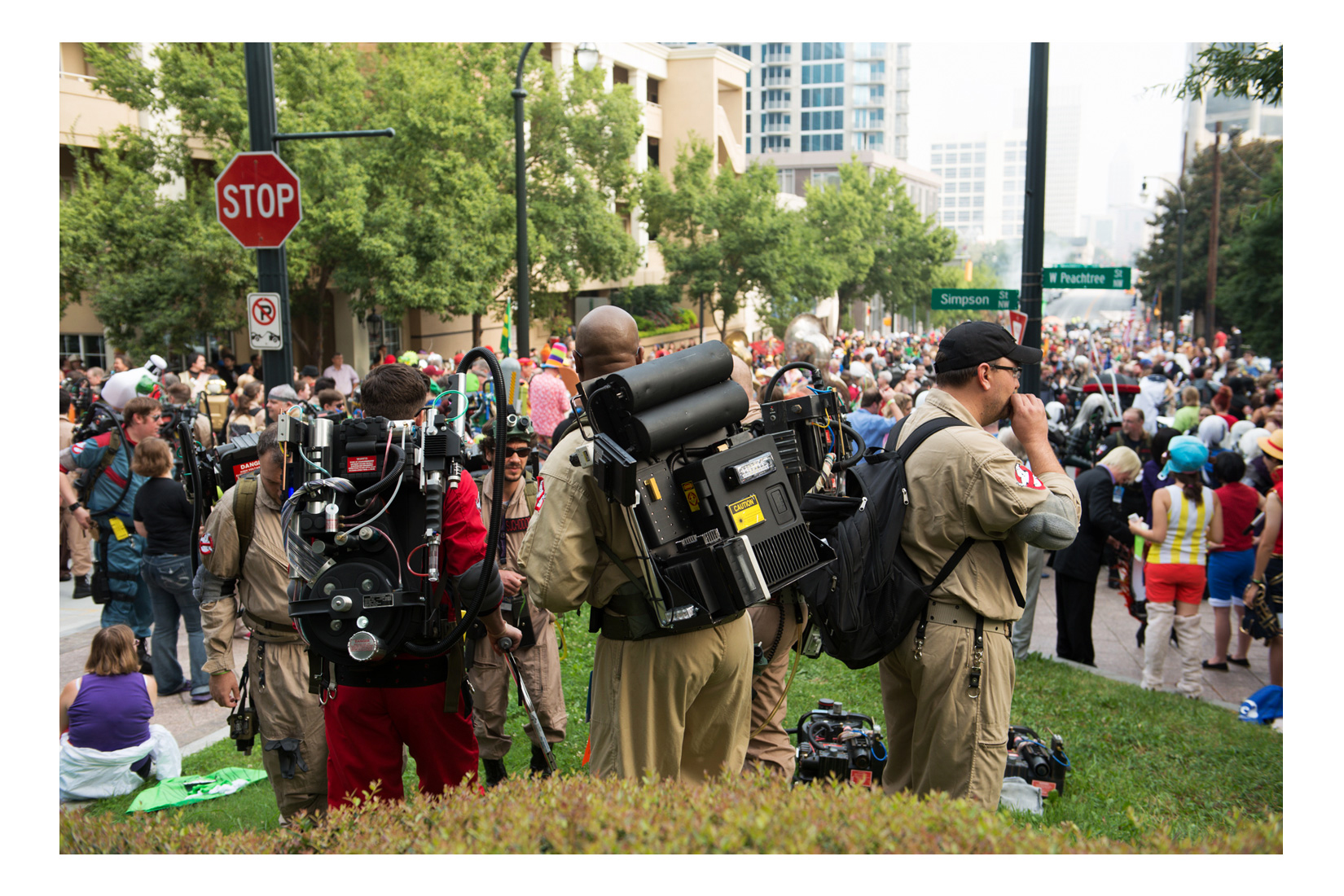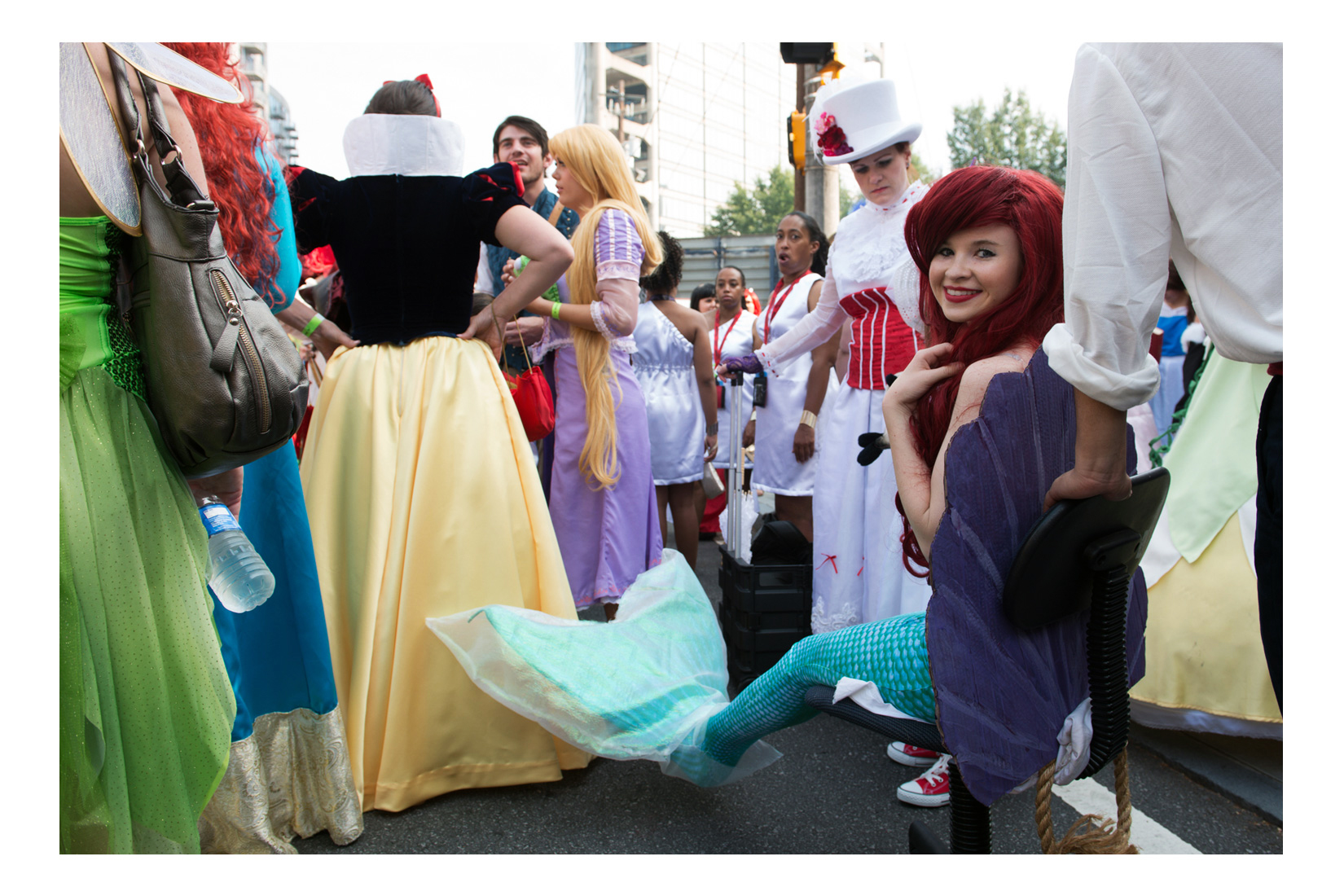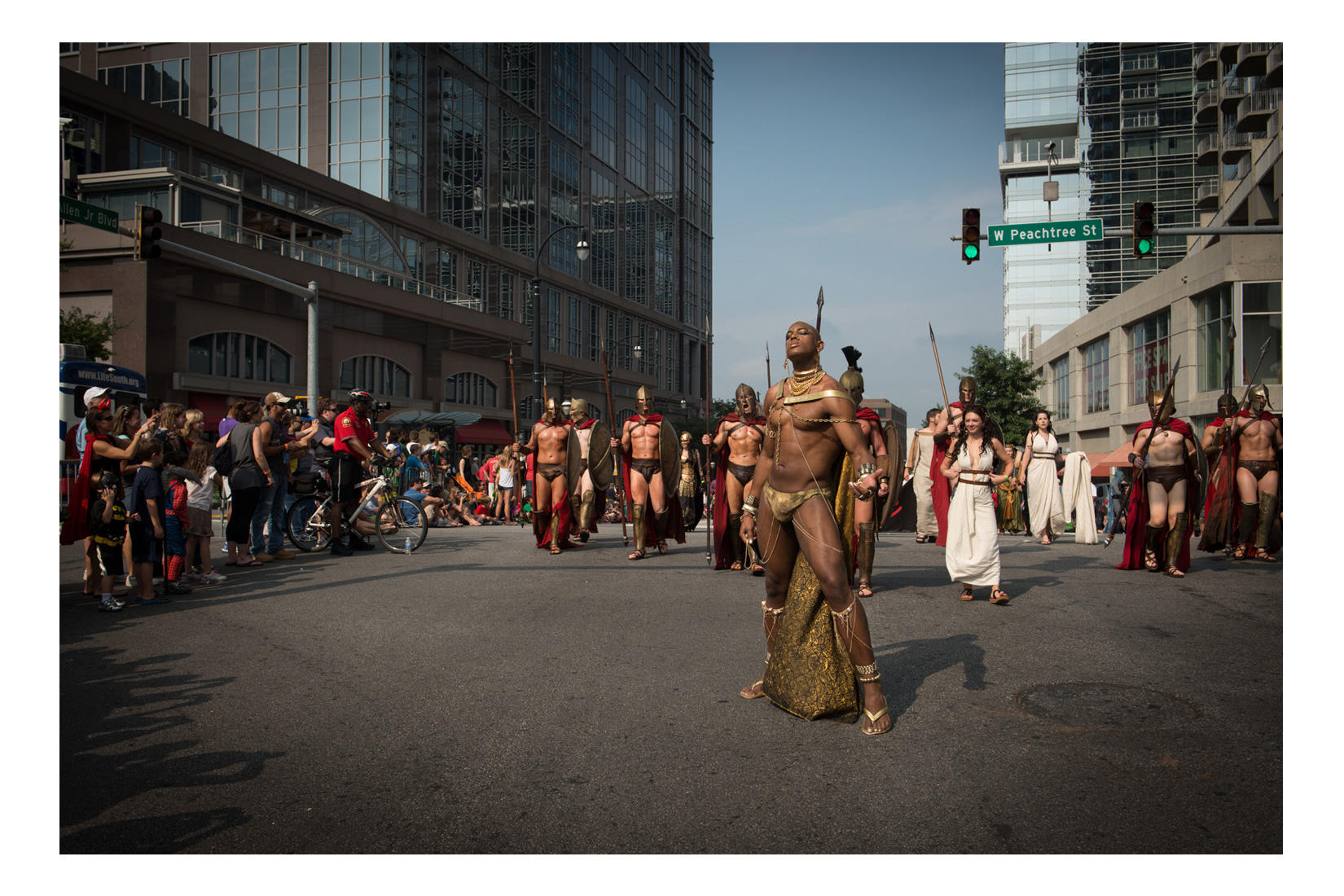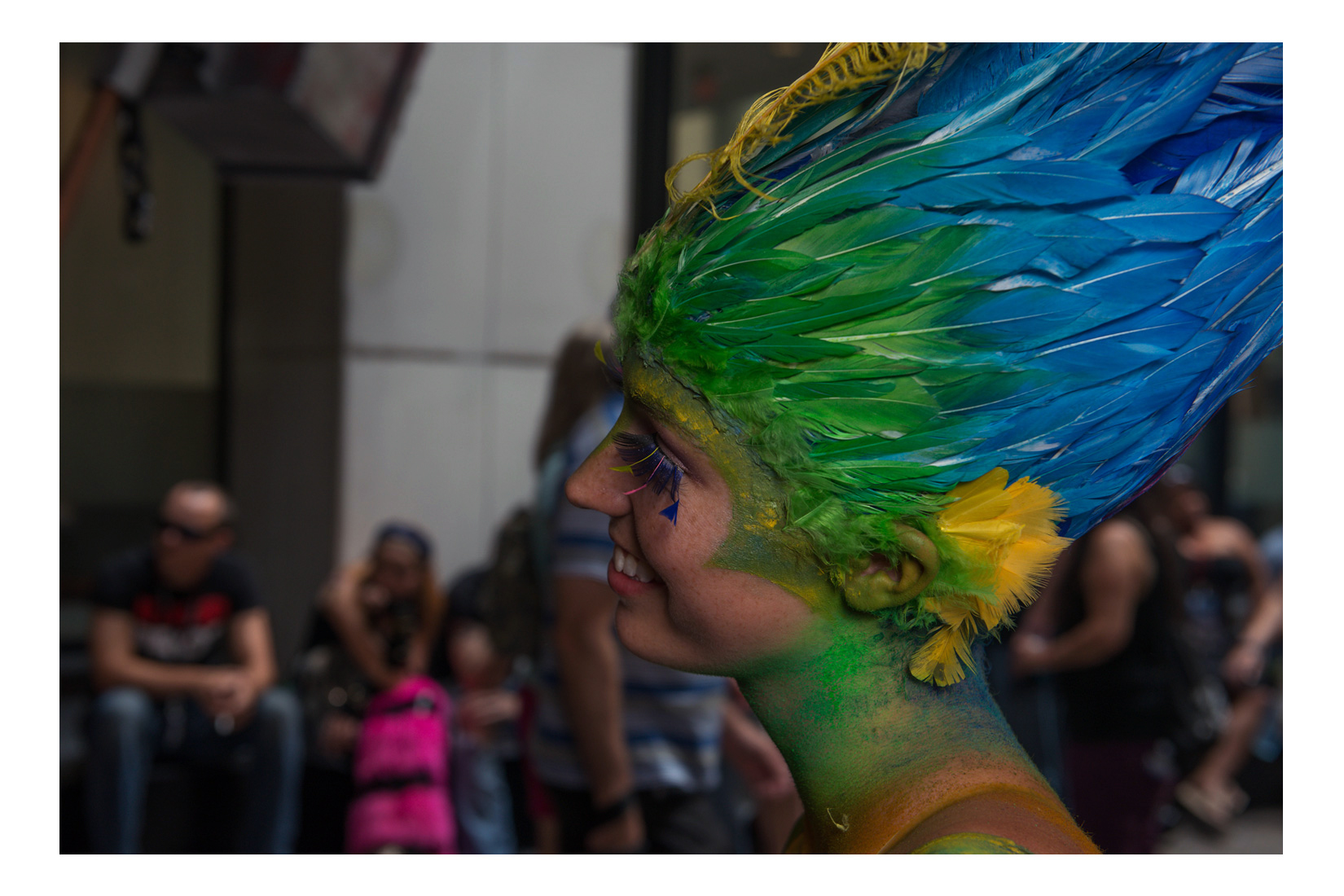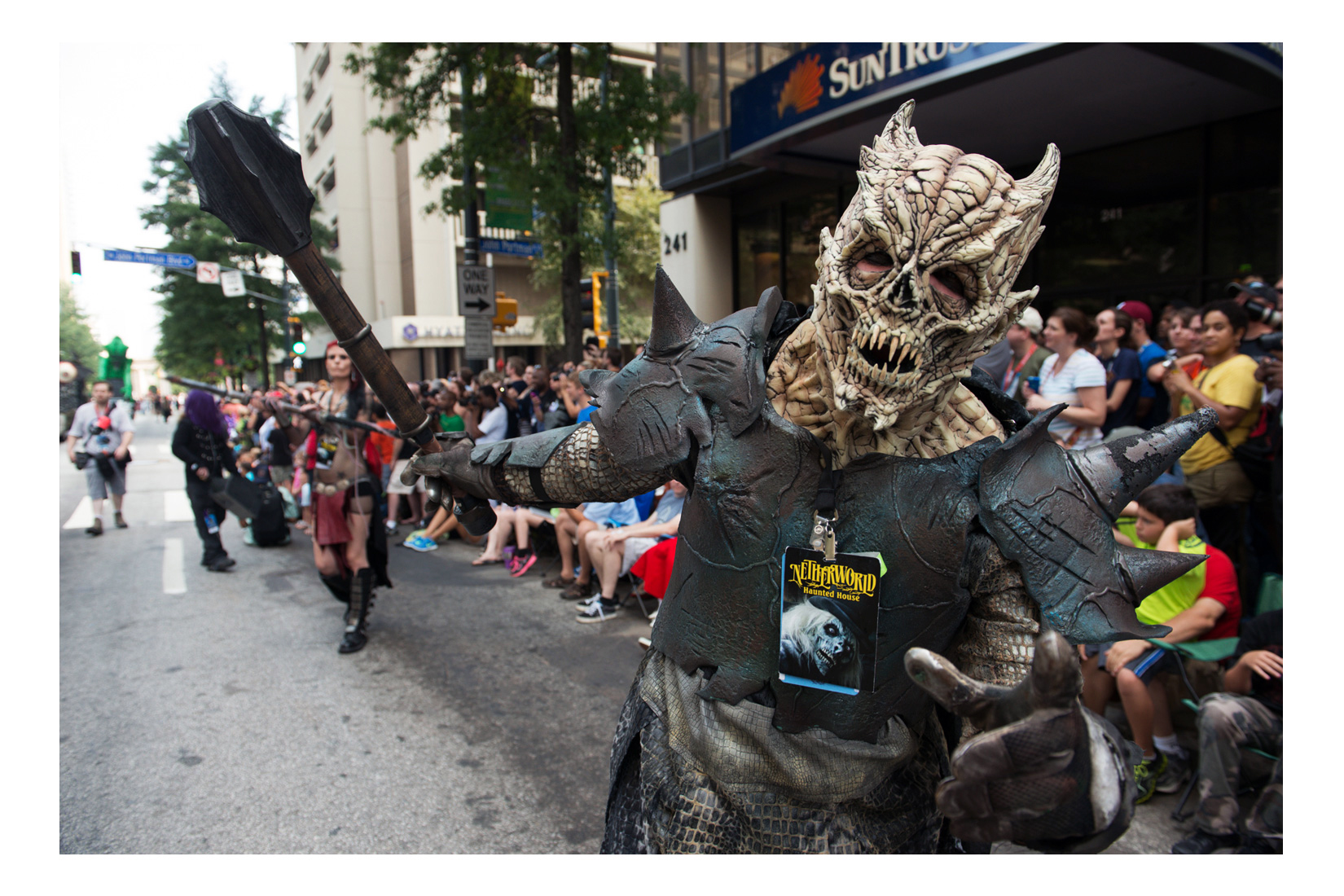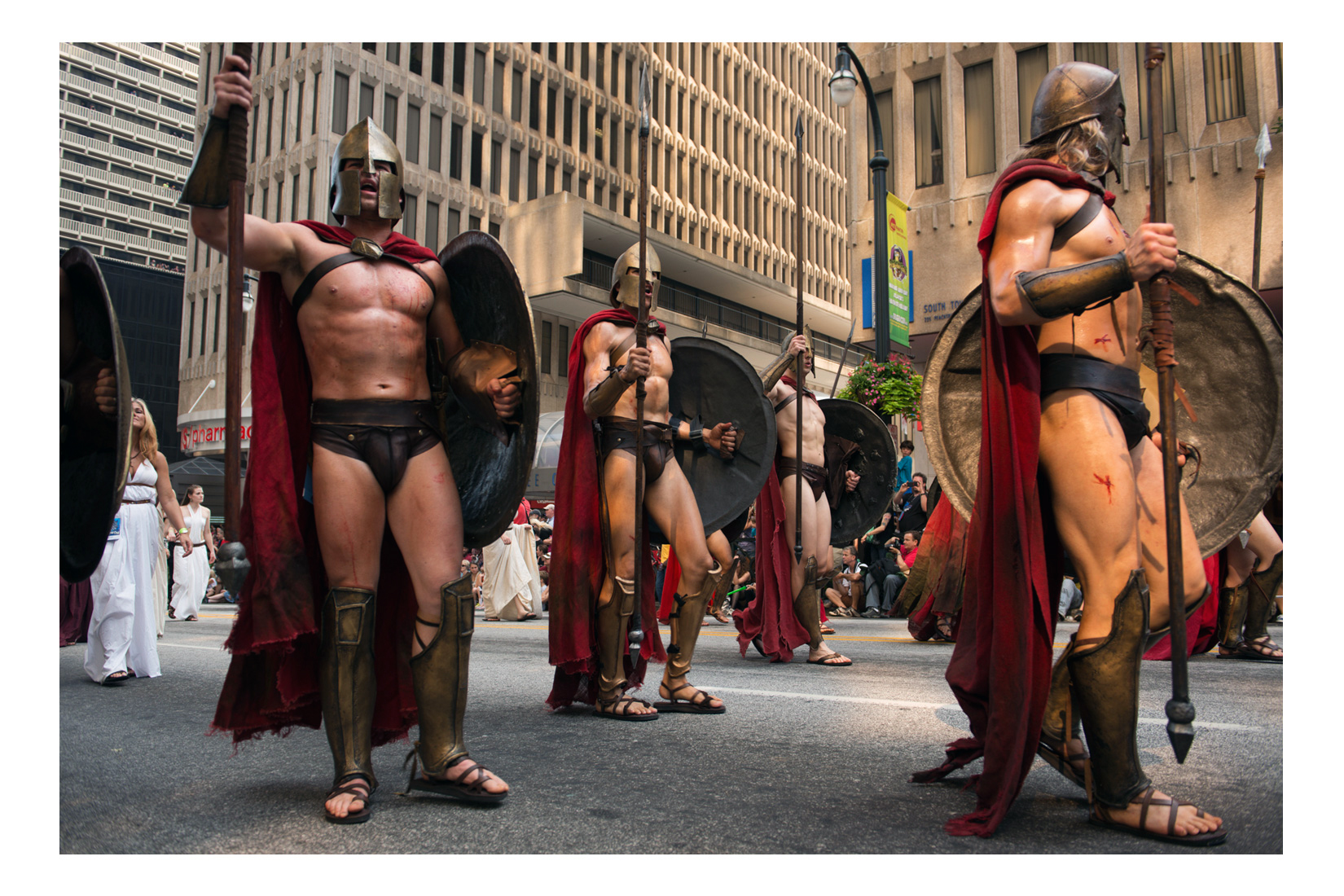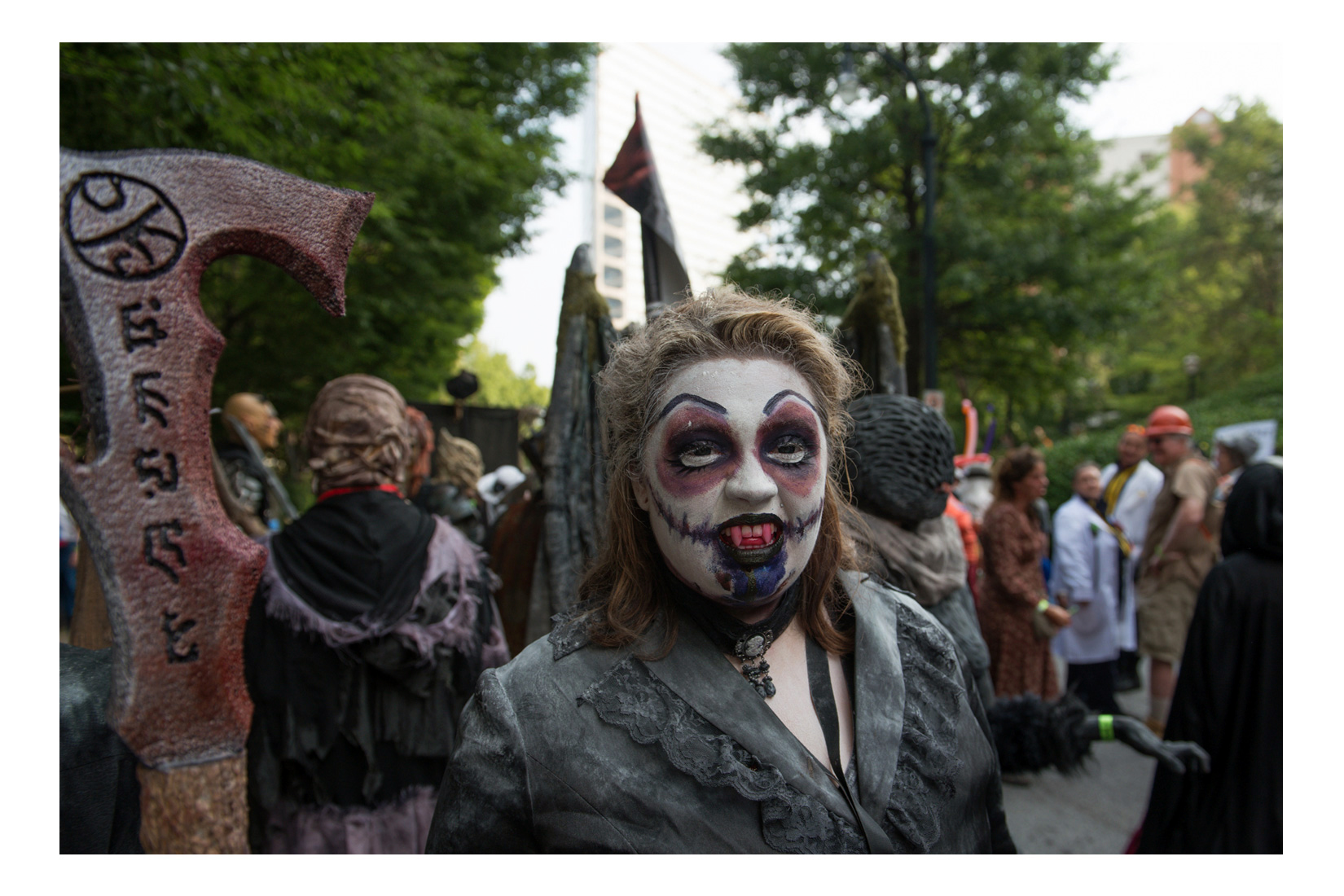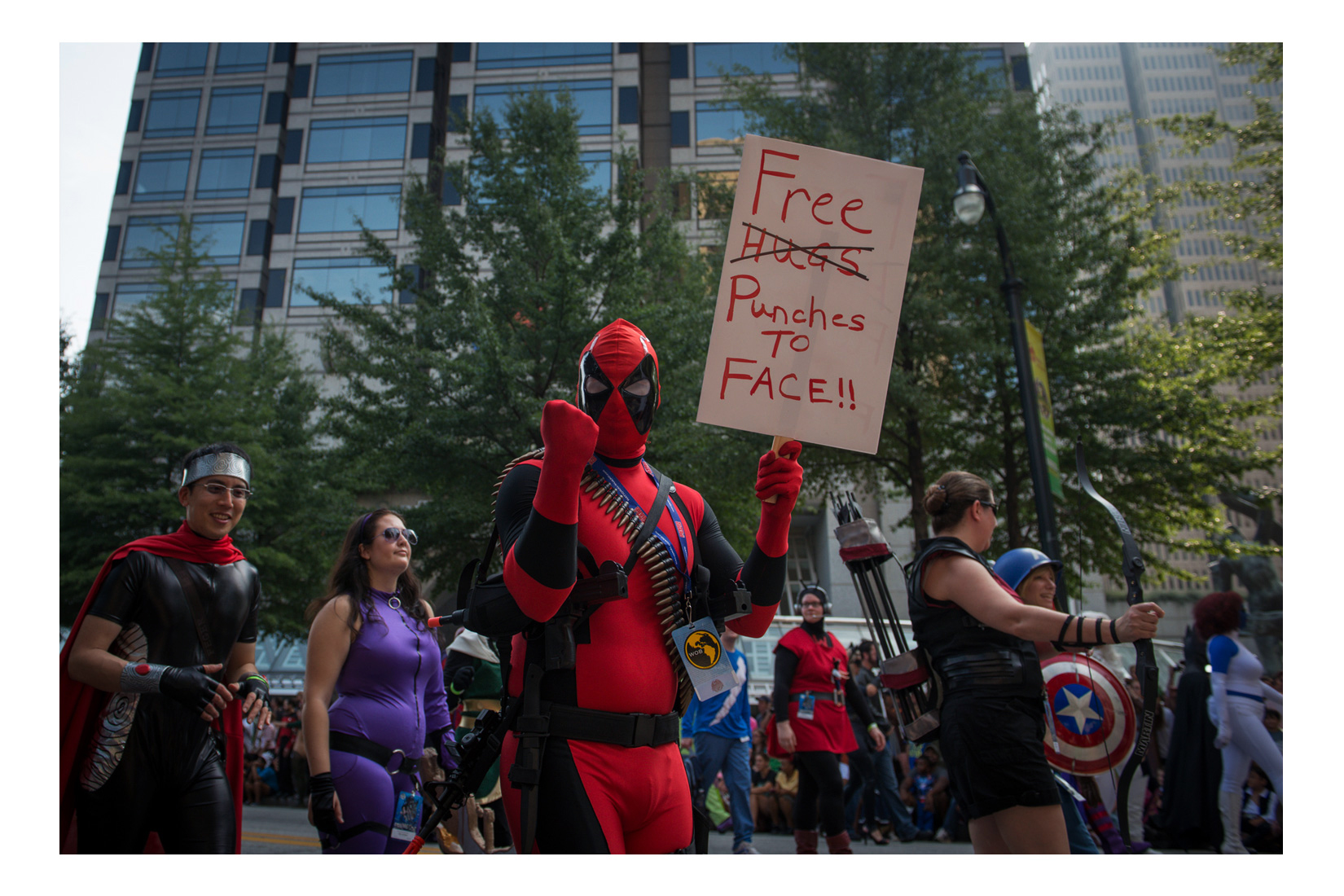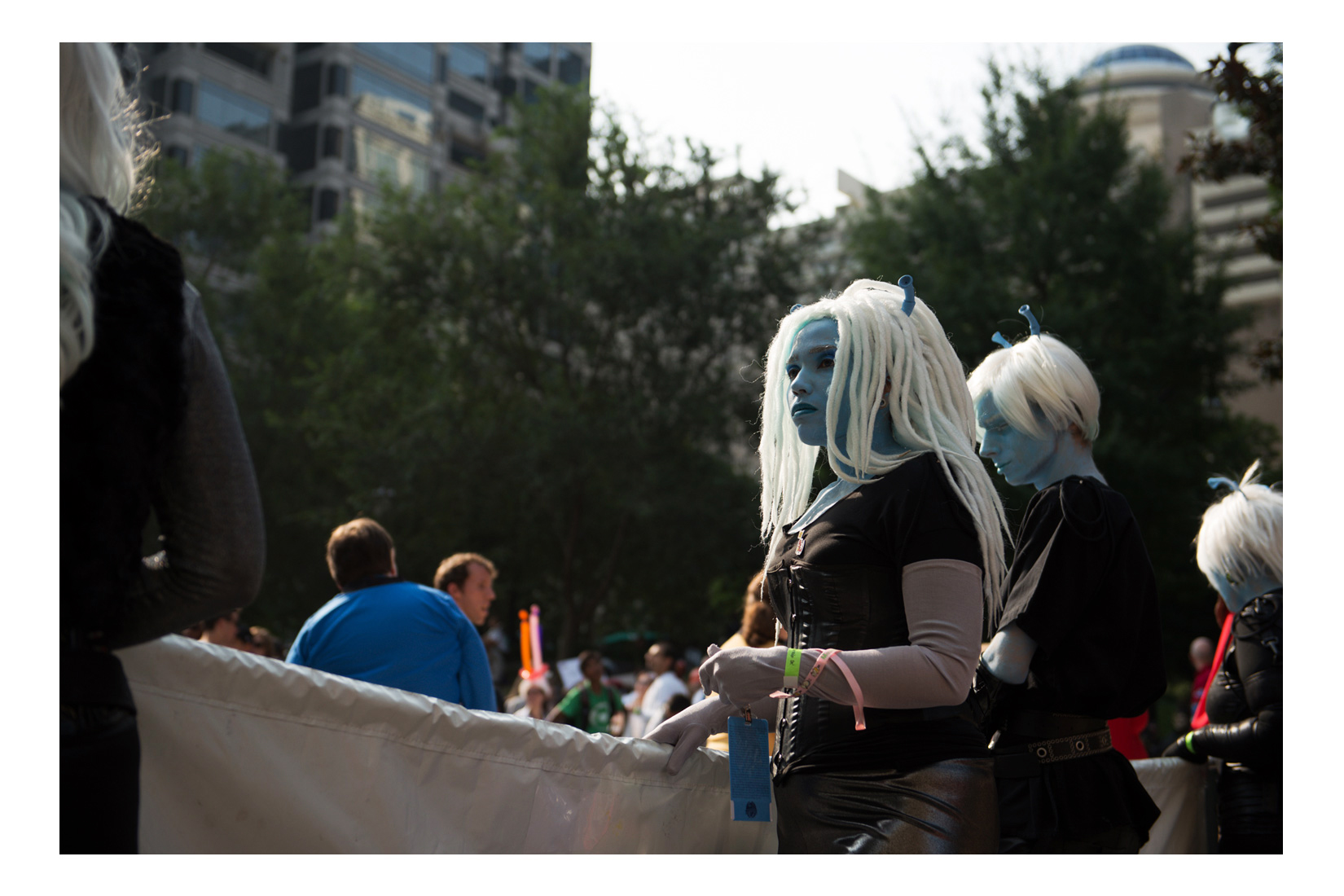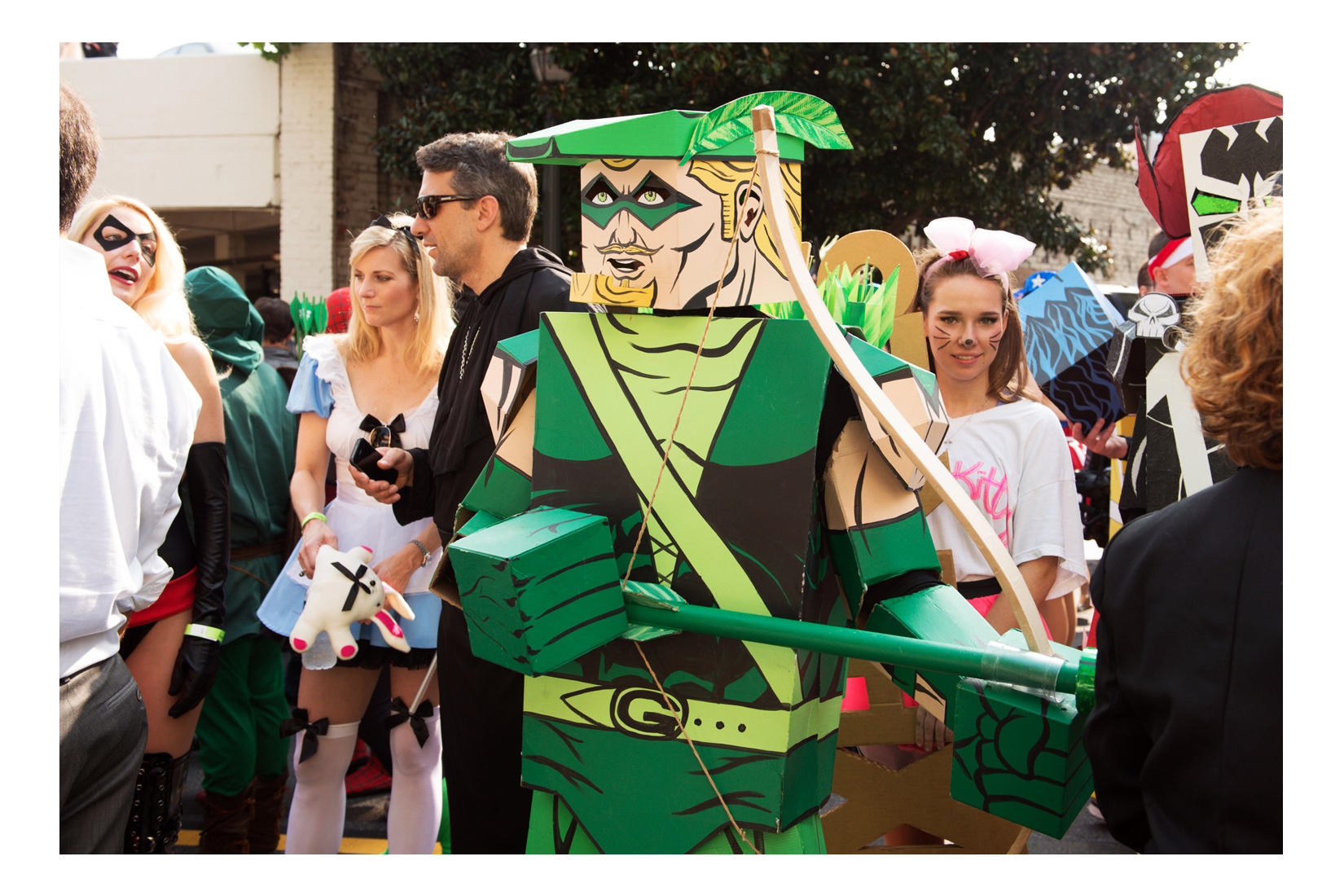At the moment of epiphany, I wasn't drunk enough.
Around midnight Saturday during Dragon Con, the pool area of the Hyatt Regency Atlanta had turned into a ludicrous combination of the “Star Wars” cantina and the depraved party from “Eyes Wide Shut.” I wanted to see zombies invade the hook-up scene, peering over the heads of half-dressed women wearing tiny steampunk hats and men dressed like Spartan warriors.
Instead, I found myself drawn into a half-circle phalanx of camera-wielding admirers surrounding a young woman from the Florida Panhandle named Desire Simpkins. A jade green dragon, painted directly onto her skin, curled around her torso to clutch at her pert, exposed breasts, leaving her elfin Natalie Portman-esque features and gymnast’s smile almost completely ignored in the scrum.
I suspect Simpkins could have walked through the same crowd a day later, wearing street clothes, and gone utterly unrecognized.
And she knew it. She’s been coming to Dragon Con since 2006. I made an argument, that Dragon Con and zombie pop-culture reflect Southern culture. She disagreed.
“The only Southern people I’ve ever seen here is when there’s an Alabama football game here,” Simpkins said while cameras flashed around her. “And they look at us like we’re crazy here. So I take pictures of them. I’m like, look at those crazy people. They’re wearing, like, pants with elephants or sheep or something, I don’t know.” She stepped away for a moment to pose for another shot.
I say I wasn’t drunk enough because if I’d been properly hammered, I would have had the sense to drop the miserable, gentlemanly pretense of maintaining eye contact with a gloriously naked woman and just taken one good look down, like a responsible journalist would.
“Southern culture, what is that?” she continued, rapid-fire, contempt oozing from her every word. “The blonde hair, the blue eyes, the properness?” She came to Dragon Con to escape from Southern culture, from bless-your-heart etiquette and Duck Dynasty protocol, to do her thing without judgment. “Who says, ‘F#@k! Sh#t! B@lls!’? Gimme a break. People at Dragon Con do. What does a Southern lady know about goddamned ‘Star Trek’?”
And then another woman, also topless in body paint, sauntered into the conversation, to finish Simpkins’ thought in her best Scarlett O'Hara voice. “Ah do declai-ah, the Kling- awns can kiss my ass,” she said.
That’s when I got it. I understood the draw of zombie culture in Georgia. Everything became clear. I got why the largest science-fiction and fantasy fan convention in America ended up growing in the heart of Dixie. Zombie culture is an allergic reaction to certain of our more ... genteel traditions.
Think of it this way. The quintessential phrase necessary to understand the zombie South isn’t “Bless your heart.”
It’s “F#@k all y’all.”
There’s something about the rigidity of Southern cultural expectations that can make a whole lot of folks seek the absurd on general principle. Most of the time, proper appearances matter in the South. This is an old joke: You always take two Baptists fishing, because if you only take one, he’ll drink all your booze.
But it doesn’t matter if we’re talking about “real-ass” black men in south Atlanta, pickup-driving NASCAR fans in Tallahassee or the genteel doyennes of Charleston. The Dragon Con crowd — the zombie South — is a different breed. They are cultural apostates. They worship at the Church of Being Yourself, Southern-style. Parishioners on a zombie walk or at Dragon Con wear funny hats and corpse makeup and dress like Voltron because no one knows who the hell you are when you’re in costume.
That’s the real allure of zombie pop culture here. Zombies represent freedom from convention and cultural expectations in a culture that values convention and expectations, very highly.
Photo by Brett Falcon
But the question of Southern-ness, to zombie-philes, seems ... out of place. It elicits a kind of weird defensiveness. Zombie pop culture is a geek thing, and geeks aren’t Southern, or so I kept being told by the geeks. And look at all the people from California and New York and Chicago at Dragon Con, people shouted at me.
Never mind then that Dragon Con’s 57,000 attendees are almost all Southern.
According to 2012 credit card receipts, right around half come from Georgia, and half of those come from metro Atlanta. About five out of six Dragon Con visitors come from the traditional Southern states.
“There are a lot of people who want to prove that they’re intelligent, even though they’re from the South,” says Rebecca Carter, a horror writer from near Charlotte, N.C., and occasional zombie Velma (you know, from “ScoobyDoo!”) at Dragon Con. “I can be very redneck and talk about truck pulls. I think people like to play with that duality a bit.”
Photo by Brett Falcon
Tami Cicala, a 52-year-old stay-at-home mom from Grayson, Ga., led a troupe of her zombie role-playing family members to Atlanta’s grand, Moorish movie temple, the Fox Theater, a few weeks ago for a costume contest ahead of a screening of “Zombieland.”
“My husband started watching ‘The Walking Dead,’ and I thought, ‘I really love this show,’” she says. Cicala, zombie-fied, was there for the costume contest, but she really wants to be in pictures. Well ... a picture. Only one show. “I would just die to be an extra on ‘The Walking Dead,’” she says. “It’s more the pretense of it than anything ... the dressing up, kind of being in that character of a dead person, alive.”
She giggles a bit, talking about it. “I’m a go-to-church-on-Sunday mother of two sons, wife of a judge. I’m very conservative. I’m not the kind of person who you would ever, ever pick out of a crowd to say, ‘She wants to be a zombie.”
Dragon Con feeds off this escapist vibe like a modern masque, a costume ball in which the normal rules don’t apply because no one knows who you are and everyone there is up to no good, more or less.
Certainly, good and proper Southern gentlemen and young ladies would not queue in an 800-foot line for an 11 p.m. BDSM panel, nor would people be turned away from the late-night discussion on “Dragon Sex” or “Adult Origami,” would they? Surely the clothing-optional underwear party in the Marriott was thrown by Northern interlopers. And let us not discuss the secrets of the midnight drum circle. Plausible deniability reigns, as long as you don’t make eye contact when you slip out of bed in the morning.
After all, under these circumstances, “F#@k all y’all” can carry multiple meanings.
Photo by Brett Falcon
Plainly, the comic-book nerds of Seattle and the George Romero partisans of Pittsburgh – never mind the voodoo houngans of New Orleans – might take issue with Atlanta calling itself the zombie capital of America, or even the South. Zombie pop culture is a global phenomenon, after all.
But a couple of things cement Atlanta as the place to be when talking about zombies.
First, Georgia’s film and television industries have been growing fast in recent years, with a $1.3 billion haul last year, just edging out Florida for fourth place behind California, New York and Texas. The only places you might be more likely to stumble across a movie shoot in this country are in Los Angeles, New York or maybe Washington. About 23,000 people in Georgia work in the business one way or another according to the Motion Picture Association of America.
One televised jewel shines above the morality plays of Tyler Perry, the tarnished luster of the CNN tower, the glorious weird of Cartoon Network and the execrable rise of Georgia-based reality television like the please-kill-yourselves “Real Housewives of Atlanta” and the nuke-it-from-orbit “Here Comes Honey Boo Boo.”
“The Walking Dead,” filmed an hour south of Atlanta in Senoia, Ga., remains the single most popular show on cable television. More people watched season three than any drama telecast in basic cable history – a record that is unlikely to be broken as the television universe fractures into unwatchable anarchy. And it is unmistakably – perhaps stereotypically – identifiable as Southern.
“We have to give credit to Robert Kirkman,” says IronE Singleton, who played T-Dog on “The Walking Dead” before being eaten (heroically) earlier this year. Kirkman, a Kentuckian, set the comic on which the show is based in Georgia because, Singleton says, “the South has a certain mystique to it, things that people don’t understand about it. So it lent itself perfectly to an apocalyptic world, better than New York or L.A.”
IronE Singleton as T-Dog on AMC's "The Walking Dead" Photo by Gene Page/AMC
I met Singleton and his fellow “Walking Dead” actor Michael Rooker at Dragon Con. Singleton is a native Atlantan, while Rooker grew up in Jasper, Ala., 40 miles from Birmingham. Rooker described his character Merle Dixon, the racist amputee killed at the end of the last season, as “a perfectly written cliché Southern backwoodsman.” The compelling arc of his character was like a great country song. “It starts out bad, there’s some good stuff, and then it ends up bad,” he says.
Similarly, Georgia has been a popular place to film science-fiction and horror movies like “The Hunger Games” series, the “Halloween” remake, “Contagion” and what-not. The Georgia-filmed “Zombieland” held the record for a while as the highest-grossing zombie movie ever made, beating out “28 Days Later” and the “Dawn of the Dead” remakes, George Romero be damned. (The title briefly passed to “Resident Evil: Afterlife” before landing firmly on the shelf of “World War Z” this year.)
The economic development folks know the power of zombies here: They’re the ones who suggested a “Zombieland” screening at the Fox during Dragon Con.
The second consideration: If the apocalypse is viral, eventually people will find themselves banging on the door to salvation at the headquarters of the Centers for Disease Control and Prevention in the bowels of Atlanta’s Emory University.
The CDC actually expects it. They’re prepared for it, and they expect you to be, too. The CDC’s tongue-in-cheek preparation guide for the zombie apocalypse became one of the institution’s most successful outreach mechanisms for disaster preparedness. Now the CDC site maintains a zombie blog, has a zombie novella comic book, and the CDC Foundation maintains a volunteer “zombie task force” of supporters.
The title of World’s Greatest Zombie City is an aesthetic distinction, of course. But zombie pop culture emerges regularly and without a whole lot of provocation in Georgia, from zombie pub crawls to zombie 5k runs (there’s nothing quite as invigorating as a run while being chased by zombies) to zombie film festivals and a zombie contingent in every major parade, never mind the multiple zombie walks peppering metro Atlanta through the year.
Still, I think zombie culture here stems from more than the happy accident of a few film productions taking advantage of the state’s lucrative tax credits or the serendipitous location of the CDC’s headquarters.
Photo by Brett Falcon
Now, normally, this is where a story about Southern culture and zombies would turn into some revisionist bullshit about the Great Lost Cause and how the legacy of the Civil War feeds into a sense of apocalyptic thinking that is somehow unique to the South, or some other lukewarm nonsense about the Southern fascination with the macabre, complete with references to Faulkner’s short story “A Rose for Emily.” (Fun fact: Faukner’s weird tale of Southern stubbornness and necrophilia was put to song by the British band The Zombies in the ’60s.)
But that dog don’t hunt with me.
I think the pop-culture draw of zombie fiction here has much more modern roots. Far too many of us here find ourselves broke and pissed off about it. Social stratification and economic mobility have always been tougher in the South, but that problem metastasized during the recession. Atlanta happens to be the least socially mobile city in America. If you’re born poor here, you’re more likely to die poor.
Unless the world goes to hell in a handbasket first, that is.
“If you’re talking Deep South, then, yeah, that’s where you get your preppers,” says the horror writer Carter. “We like to think that we can take care of ourselves. We have our rifles and our stockpiles.” Carter sees the effects of decades of manufacturing losses, closed tobacco farms and textile mills every day near her North Carolina home. Zombies are fake. Despair is real. “People like to read about things that are worse than they see,” she concludes.
The social order reflects the economic order. There’s surprisingly little cross pollination between economic strata here. Most of the places in America with high income inequality are in the South. People in Atlanta and Charlotte and Memphis can still live most of their lives without crossing the railroad tracks.
The lure of the apocalyptic comes from being able to upend the social order. Rich people presumably taste just as good as poor people, after all. But for the constraints of modern society, a man or woman with natural talents and intellect might rise to power and relative wealth, or so goes the thinking. The zombie apocalypse is the great reset button.
“It’s the Etch A Sketch effect,” says Chesya Burke, an author and critic of “The Walking Dead” series. “There’s an attractiveness to reducing life to food, water and shelter.”
Of course, most of humanity has to get killed first. And then get up and chase you. And then get killed again.
More From Dragon Con:
Photographer Brett Falcon takes us through the lens and into the heart of Dragon Con.
See More
Next Week:
We Get Even Freakier
Dana Seith looks completely normal. If you saw her step out of a minivan, you would not be surprised. If you met her at a party, you’d think to yourself, “What a nice woman!” You would not think to yourself, “She looks like she’s spent a long, long time at the Clermont Lounge.” But actually, all of those statements are true. For the last three years, Seith has had unlimited access inside Atlanta’s most legendary strip club, and this Christmas, you’ll see the book that is emerging from her research: “No Cameras.” Next week, we bring you Seith’s memoir of her nights (and days) with the ladies of the Lounge. And despite the title of her book, we’ll have the pictures, too.
The Bitter Southerner©2013 All rights reserved.
To contact The Bitter Southerner for any reason at all, you can connect with us through Facebook.


